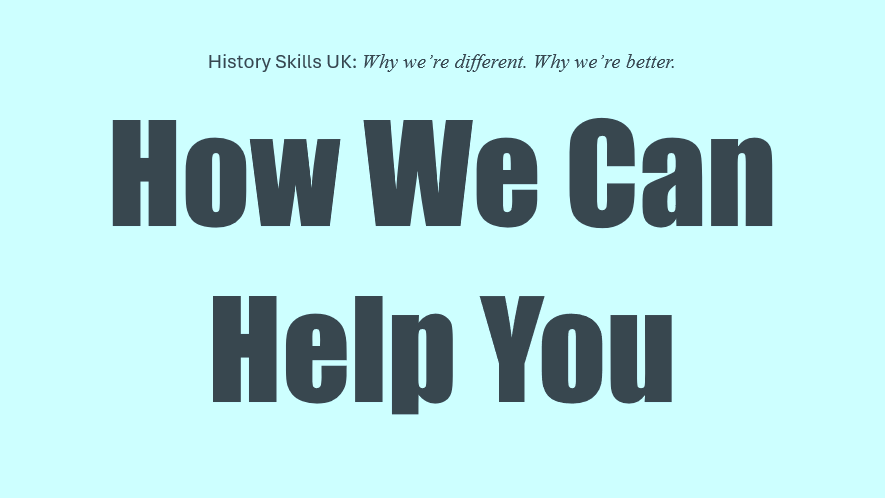Before You Go
Preparing To Study History At University
MTL Bennett
9/15/20258 min read


Introduction
So, you’ve got the exam marks you needed. You’re off to University in the autumn. Well done!
But here’s the thing. You’re about to take a huge step. The world you’re about to enter is unlike anything you’ve experienced before. Better be prepared.
Preparation Is Key
Anxious? That’s understandable. It’s okay to be worried about things that are unknown.
Would knowing what to expect help? And are there things you can do now to help you prepare for what is coming?
The answer is yes, of course! In facing all of life’s challenges, preparation is key. So, here’s some ideas to help you get started with that.
Practical Matters
#1 – Accommodation
Where you live will be one of the biggest factors in your success at university. You will need your place of residence to be comfortable, secure, convenient, and with facilities that enable you to eat well and study effectively.
#2 – Money
You will probably receive a maintenance grant but be aware that with the current cost of living and the activities now available to you, those funds might be stretched to the limit.
So, before you go, we suggest you attempt to try to create some sort of budget.
Suggestions to add to the list: Food, Laundry costs, Cleaning products, Personal care/make up, Travel costs, Books, Stationary, Software, Necessary Clothing, Subscriptions/Memberships, Going Out (once or twice a week), Insurance, Unexpected events
We also suggest you research your options for a student bank account wisely – look at articles on moneysavingexpert.com - and consider how working to earn extra funds can fit in with your studies.
#3 – Getting About
Three or four days a week you will have to go to the university. And there will also be other times you need to travel - going to the library, food shopping, social activities, appointments with your GP or Student Services.
How you will travel is something you need to think about before you go.
Can you walk? How good are public transport links? If you have a car, where will you park it. If you have a bike, where will you store it?
Also, how often will you have to travel to and from home? What method of transport will you use? How much will you realistically be able to take with you?
#4 - Health and Wellbeing
We recommended that you register with a GP near your university as soon as possible. In addition, you should enquire what facilities are available at your university to help with your mental health and wellbeing.
#5 – Specific Needs
Not everybody comes to university in ‘perfect’ health or without specific needs. In fact, a significant number of undergraduates face hurdles during their studies and it is essential to consider these before starting your course.
Issues such as impediments to learning, health concerns, childcare needs and financial problems should be raised with Student Services well before you go.
#6 – Food, Clothing and other things
Along with developing healthy sleeping patterns and taking regular time out to relax, it is important to get into the habit of eating sensibly and (relatively) healthily during your time at university.
The unpredictable UK weather makes having appropriate clothing an essential requirement too.
Also, think about stationary: pens, paper, files, Post-It notes – all are useful at university.
#7 – Language Skills
It’s not essential to have knowledge of an additional language when doing an History degree. It does, however, provide several advantages – both for future employment and for continued studies at postgraduate level.
How A Degree Works (What To Expect)
University Is Different
Studying History at a university is very different from studying History at ‘A’ Level, whether at school or in college.
There is no longer the broad curriculum of school-based study. Undergraduates will be exposed to a wide variety of historical subjects, selected by the individual university department and often reflecting the teaching interests of staff members or resources available.
In addition, there is a major focus upon developing critical thinking. This will involve students analysing sources, using evidence to make a case, demonstrating understanding of how historians reach judgements, developing self-awareness and responding to criticism in a positive way.
Failure to appreciate and adapt to these differences often leads to students struggling in their first year.
How A Degree Is Structured
In simple terms, a degree course offers a broad overview of the subject to begin with, then increasing specialisation as the course goes on.
In History, critical thinking will initially be the focus of skills training, supplemented by History-specific skills, relating to the use of sources and the development of empathy amongst other things.
A History degree will most commonly last 3 years.
In the 1st year, students will have compulsory modules related to issues around the practice of history and the development of critical thinking, as well as 2-3 optional modules relating to specific time periods or issues. At the end of the 1st year there will be an exam which the student will have to pass in order to continue their studies.
In years 2 and 3, students will take more compulsory modules related to the practice of History, as well as modules which are increasingly specialised. In Year 3, students will usually be expected to produce a small dissertation on a particular subject, with a related presentation.
There will then be a Final exam to determine overall grade.
Your First Year
Your first year at university will largely involve general introductions to the subject, developing critical thinking skills and exploring options for more focused study later.
It will also introduce you to the basic structure of teaching at university:
Lectures
Seminars/Tutorials
Feedback and One-to-ones
You will usually face 3-6 formal assignments per term, plus classroom-based activities such as presentations.
Assignments usually involve a written essay of 500-2,000 words. There will also be regular short tests and a mock exam during your first year, with a formal exam at the end.
You will be taught by a variety of tutors, varying in seniority and experience. In the 1st year, there will be sessions led by Associate Tutors, as well as more senior staff with particular specialisms.
Resources
Undergraduates will have access to a range of resources: a Library stocked with copies of the works you are required to read; specific Study Areas, as well as physical and online access to a range of primary and secondary sources.
Resilience
Finally, be aware that a degree course is meant to be challenging and there will undoubtedly be moments that are difficult and even stressful. There are structures in place to help you with the worst moments, of course, but please be aware that dealing with stress is one of the skills you will need to acquire at university. Learning to develop resilience is incredibly important.
Preparing To Study History
Researching Your University
You can find a lot of information about your course by looking at the History Department website for your university.
Look at the modules (compulsory and optional). Consider your institution’s specialisms and try to find out your prospective tutors’ research interests – these will help you decide which optional modules to take going forward.
Preparatory Reading
When you start your course, you may be surprised at how much reading you are expected to do. If you don’t regularly read at the moment, it would be wise to get into the habit of making time for daily reading over the summer.
You can use the time to read general surveys to help you develop a sense of the general sweep of historical events – helping you develop contextual awareness when looking at primary sources during your 1st year.
You can also familiarise yourself with some major themes (e.g. Reformation, Industrialisation, French Revolution, etc) by using the Very Short Introductions series from Oxford University Press.
It is advisable to look at books dealing with the specific skills needed by historians, as well as approaching the issue of controversy in History through studies of Political (ab)use, Empire, and the representation of women.
A full list of suggested books in each of these categories is available to members. Sign up here.
Referencing
Be aware that you will be expected to follow a particular style when referencing. This varies between institutions so you need to find out what style your department uses as soon as you can.
When you have discovered which referencing style you should use, we suggest you use a software tool like Zotero, as this will make the process of inserting footnotes and producing a bibliography a whole lot easier.
Social Media
There will probably be a Facebook group, or something similar, set up for Freshers in general and History undergraduates in particular. They are generally worth joining although (as always with social media) use with caution.
How We Can Help You
University study can be challenging.
There will be new skills to learn, such as note-taking, class presentations and writing assignments. There will also be practical issues as well – living away from home, managing a budget, balancing a social life with academic success.
And there may also be the things they never tell you about in the glossy prospectuses. Loneliness. Dealing with criticism. Self-doubts.
At History Skills UK, we understand what a rollercoaster ride studying at university can be.
Our advisors have been through the process themselves. We have experienced the highs and lows. We have faced difficulties and discovered ways to overcome them. And some of us have experienced both sides of the coin, having been tutors as well as students.
Why we’re different.
The knowledge we have gained is something we are happy to share with you!
Sure, you could spend a lot of money on expensive Study Skills Guides or wade your way through long and difficult to understand textbooks about what History is and isn’t. There’s a whole industry out there of people exploiting your insecurities and inexperience, aiming to make themselves rich at your expense.
We are able to offer you advice and support that is directly relevant to your needs, of the highest quality and at a price that won’t break the bank.
Our Services
At History Skills UK we offer a range of services for students (and prospective students) of History in the UK and Ireland. From workshops and one-to-one sessions to essential guides and the kind of practical advice you won't find anywhere else.
Our Members receive a range of guides on subjects directly related to acquiring the skills vital to success as well as subject-specific knowledge which will help them stand out from the crowd.
These guides are updated regularly, with new ones arriving every fortnight, and build up to an impressive toolkit of advice and information.
We can also offer One-To-One guidance on specific areas, tailored directly to the needs of individuals.
Benefits
Existing undergraduates can receive tried and tested advice on improving their performance at university, as well as one-to-one help with specific issues.
Those considering applying for a History course will get a head start on others in their cohorts, as well as being well prepared who whatever problems may arise.
Tutors will also benefit!
If students are better prepared, they will need less help with the mechanics of producing work to university standard. They will write better assignments, ask for less help and be able to develop faster and more efficiently.
This will save tutors valuable time and allow them to do more of what they do best: teach History!
Everyone’s a winner!
By using our services, everybody wins!
So, what are you waiting for?
Sign up here and start succeeding at university TODAY!
This article was written by MTL Bennett in August 2025.
This is a FREE article. If you found it useful, please consider buying the author a coffee to help them keep going! Donate here: https://ko-fi.com/historyskillsuk








This is a FREE article, offering a short summary of advice drawn from a series of articles exclusively available to Members.
If you find this useful, please consider buying the author a coffee to help them keep going! Donate here: https://ko-fi.com/historyskillsuk

